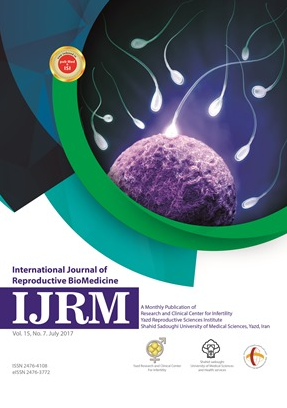
International Journal of Reproductive BioMedicine
ISSN: 2476-3772
The latest discoveries in all areas of reproduction and reproductive technology.
Expressions of vascular endothelial growth factor A, mucin-1, colony-stimulating factor-1, heparinbinding epidermal growth factor-like growth factor, and fibroblast growth factor 2 genes in the female reproductive tracts of women with ectopic pregnancy
Published date: Nov 21 2023
Journal Title: International Journal of Reproductive BioMedicine
Issue title: International Journal of Reproductive BioMedicine (IJRM): Volume 21, Issue No. 10
Pages: 801–808
Authors:
Abstract:
Full Title: Expressions of vascular endothelial growth factor A, mucin-1, colony-stimulating factor-1, heparin-binding epidermal growth factor-like growth factor, and fibroblast growth factor 2 genes in the female reproductive tracts of women with ectopic pregnancy: A case-control study
Background: Ectopic pregnancy (EP) is defined as embryo implantation in a location other than the uterine cavity.
Objective: We aimed to evaluate the expression of several genes, which may play a role in EP, in the ampulla region of fallopian tubes and endometrial tissue of women with EP.
Materials and Methods: In this case-control study, 5 women who underwent salpingectomy due to EP, comprised the 5 pseudo-pregnant women as a control group. These participants referred to the Royan Institute, Shariati, and Arash hospital, Tehran, Iran during 2019-2021. We evaluated the expressions of vascular endothelial growth factor A, mucin-1, colony-stimulating factor-1, heparin-binding epidermal growth factor-like growth factor (HBEGF), and fibroblast growth factor 2 genes in the fallopian tube and endometrium of EP cases by real-time polymerase chain reaction using specific primers.
Results: The vascular endothelial growth factor expression was significantly higher in the ampulla region of the controls. However, no significant differences were observed in endometrial tissue. Assessments of colony-stimulating factor-1 and fibroblast growth factor 2 showed no significant differences between the case and control groups. HBEGF showed significantly higher expression in the ampulla region of EP cases, but no significant difference was observed in HBEGF expression in the endometrial tissues of the study groups. Mucin-1 expression was significantly higher in both study regions of the EP cases.
Conclusion: Our results have strongly suggested that these genes play important roles in proper implantation, and disruptions in their expression patterns could lead to EP. However, more studies are needed to confirm the current findings.
Key words: Ectopic pregnancy, Gene expression, Vascular endothelial growth factor A, Mucin-1, Colony-stimulating factor-1, Heparin-binding epidermal growth factor-like growth factor, Fibroblast growth factor 2.
References:
[1] Hendriks E, Rosenberg R, Prine L. Ectopic pregnancy: Diagnosis and management. Am Fam Physician 2020; 101: 599–606.
[2] Zarezade N, Saboori Darabi S, Ramezanali F, Amirchaghmaghi E, Khalili Gh, Moini A, et al. mRNA expression of VEGF and its receptors in fallopian tubes of women with ectopic pregnancies. Int J Fertil Steril 2015; 9: 55–64.
[3] Elson CJ, Salim R, Potdar N, Chetty M, Ross JA, Kirk E. Diagnosis and management of ectopic pregnancy: Greentop guidline No. 21. BJOG 2016; 123: e15–e55.
[4] McGurk L, Oliver R, Odejinmi F. Severe morbidity with ectopic pregnancy is associated with late presentation. J Obstet Gynaecol 2019; 39: 670–674.
[5] Jiang H, Li J-X. Interaction networks between the fallopian tubes and the embryo in human tubal pregnancy: Current knowledge and perspectives. J Obstet Gynaecol Res 2021; 47: 4139–4147.
[6] Brito LR, Neto EdPG, Furich DG, Savaris RF. MUC1 (VPM654 and EPR1023) expression in mucosa of fallopian tubes with ectopic pregnancy is altered. Appl Immunohistochem Mol Morphol 2016; 24: 569–574.
[7] Guo X, Yi H, Li TC, Wang Y, Wang H, Chen X. Role of vascular endothelial growth factor (VEGF) in human embryo implantation: Clinical implications. Biomolecules 2021; 11: 253.
[8] Lim W, Bae H, Bazer FW, Song G. Stimulatory effects of fibroblast growth factor 2 on proliferation and migration of uterine luminal epithelial cells during early pregnancy. Biol Reprod 2017; 96: 185–198.
[9] Ornitz DM, Itoh N. The fibroblast growth factor signaling pathway. Wiley Interdiscip Rev Dev Biol 2015; 4: 215–266.
[10] Wang H, Shi G, Li M, Fan H, Ma H, Sheng L. Correlation of IL-1 and HB-EGF with endometrial receptivity. Exp Ther Med 2018; 16: 5130–5136.
[11] Cabar FR, Pereira PP, de Oliveira MA, Francisco RPV. Serum vascular endothelial growth factor as a marker for tubal pregnancy. Rev Assoc Med Bras 2022; 68: 860– 865.
[12] Keshavarzi F, Shahrakipoor M, Teimoori B, Yaghmaei M, Narooei-Nejad M, Rasooli A, et al. Association of the placental VEGF promoter polymorphisms and VEGF mRNA expression with preeclampsia. Clin Exp Hypertens 2019; 41: 274–279.
[13] Constantinou PE, Morgado M, Carson DD. Transmembrane mucin expression and function in embryo implantation and placentation. Adv Anat Embryol Cell Biol 2015; 216: 51–68.
[14] Wu F, Chen X, Liu Y, Liang B, Xu H, Li TC, et al. Decreased MUC1 in endometrium is an independent receptivity marker in recurrent implantation failure during implantation window. Reprod Biol Endocrinol 2018; 16: 60.
[15] Okabe-Kinoshita M, Kobayashi T, Shioya M, Sugiura T, Fujita M, Takahashi K. Granulocyte-macrophage colonystimulating factor-containing medium treatment after thawing improves blastocyst-transfer outcomes in the frozen-thawed blastocyst-transfer cycle. J Assist Reprod Genet 2022; 39: 1373–1381.
[16] Sun F, Wang S, Du M. Functional regulation of decidual macrophages during pregnancy. J Reprod Immunol 2021; 143: 103264.
[17] Duncan WC. The corpus luteum and women’s health. In: Meidan R. The life cycle of the corpus luteum. Cham: Springer; 2017.
[18] Duncan WC. The inadequate corpus luteum. Reprod Fertil 2021; 2: C1–C7.
[19] Noghrehalipour N, Aflatoonian R, Rahimipour A, Aghajanpour S, Najafian A, Chekini Z, et al. The effect of altered Mucin1, FGF2, and HBEGF gene expression at the ectopic implantation site and endometrial tissues in the tubal pregnancy pathogenesis. Int J Fertil Steril 2023; 17: 242–247.
[20] Pujol Gualdo N, Estonian Biobank Research Team, Mägi R, Laisk T. Genome-wide association study metaanalysis supports association between MUC1 and ectopic pregnancy. medRxiv 2022.
[21] Mousavi SO, Mohammadi R, Amjadi F, Zandieh Z, Aghajanpour S, Aflatoonian Kh, et al. Immunological response of fallopian tube epithelial cells to spermatozoa through modulating cytokines and chemokines. J Reprod Immunol 2021; 146: 103327.